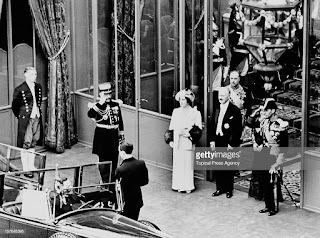Eighty years ago: an emptily symbolic Royal visit, keeping the BBC weak and bloodthirsty rituals in Spain
The
state visit to Paris of the King George VI and Queen Elizabeth finally took
place after having been postponed because of the death of the Queen’s mother.
It passed off very successfully with gorgeous ceremony and spectacle all around.
It seemed to echo the famous visit of Edward VII, the King’s grandfather, in
1903, which opened the way for the entente
cordiale, laying the ghost of centuries of Anglo-French hostility
and heralding the full-scale alliance of the two countries against Germany in
the First World War. Appearances deceived: Britain and France were no nearer anything
approaching a common front against Nazi Germany, still less a military
alliance. Beneath the superficial goodwill Neville Chamberlain was terrified
that the French alliance with Czechoslovakia might lead to a war with Germany
if the Sudeten question were not settled in Germany’s favour. Britain would
inevitably be dragged into such a war.
The
new Director General of the BBC in succession to Sir John Reith was announced. He
was Frederick Ogilvie, the President and Vice-Chancellor of Queen's University,
Belfast. He was an academic economist who had distinguished himelf by
identifying tourism as an important economic force. He had no experience of
journalism or broadcasting. He was a poor compromise between elements in the
BBC who had hoped for an internal candidate and the heads of the Civil Service
who had aimed for a civil servant, thus transforming the BBC into an undisguised
arm of the state. In the eyes of the Civil Service chiefs, the BBC was already
well-provided with “intellect and culture” and required no more at the top. Under
Reith the BBC had practically surrendered its independence so a weak Director General would be in no hurry
to claw it back. A docile BBC was a key component in the media strategy that
accompanied appeasement.
Franco’s
Nationalist Spain celebrated the second “Africa Day” to commerorate the anniversary
of the arrival of the rebel generals from Africa to begin the revolt against
the Republican government. It featured lavish parades and bullfights rather as
though military victory were already secure. The remaining Republican forces
certainly had little prospect of winning but still staged a dogged resistance
on the Teruel-Castellon front. On the one hand the Republican troops had little
hope of quarter but on the other Franco had little interest in a swift and
decisive victory. Killing as many Republicans as possible on the battlefield
offered a practical version of the
corrida with which he was entertaining the inhabits of the zones under his
control.



Comments
Post a Comment